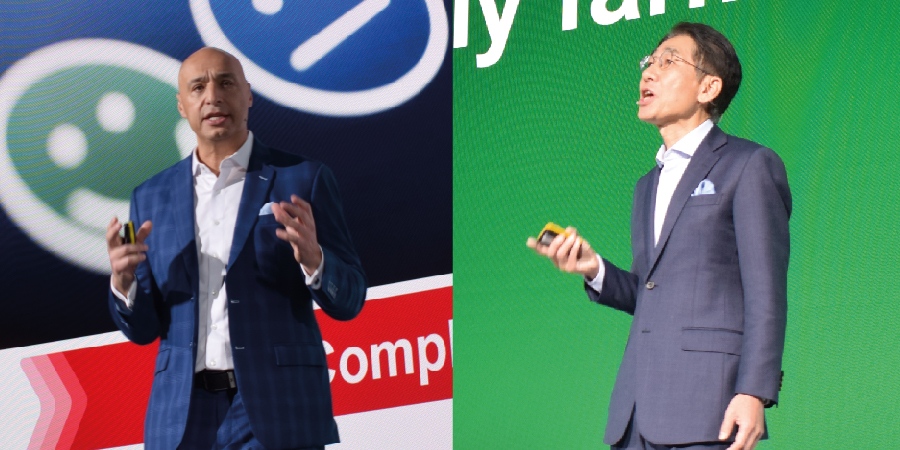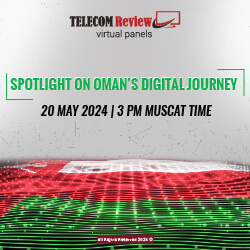Andrew Feinberg, Chairman and CEO of Netcracker and BostonGene, and Takayuki Morita, President and CEO of NEC Corporation, shared the stage to deliver a keynote during MWC 2023.
NEC is orchestrating a brighter world, while Netcracker is helping customers accelerate digital growth and profitability. Together with BostonGene, all three companies use tools that enable data analytics to achieve high efficiencies, better decisions and greater outcomes.
Modern Technology Breakthrough Treats Cancer
Feinberg shared the story about Curtis, who, in the summer of 2018, was a 47-year-old, happy, healthy man with an adorable 3-year-old daughter. He had a Ph.D., a great job and a healthy lifestyle.
That summer, however, one morning, he woke up with acute abdominal pain. After a number of doctor visits and tests, Curtis was diagnosed with B-cell lymphoma, a type of blood cancer.
As a young, healthy man, Curtis was administered what's called a “frontline treatment,” a standard chemotherapy used to treat the type of condition he had. Unfortunately, it didn't work. And neither did the next four progressively, more toxic treatments.
“Today, if two cancer patients are diagnosed with the same disease, in the vast majority of cases, they are treated the same way. The problem with that is that at the molecular level, every one of us is completely unique. And a therapy that can work really well for one can be ineffective, toxic, or even lethal for another,” pointed out Feinberg.
With no hope left, his doctor recommended that he undergoes comprehensive genomic testing at BostonGene, a company that had just received a clinical license for its breakthrough technology, and this is how they met Curtis in 2020.
By that time, his cancer had metastasized to other organs and an 11-centimeter tumor locked in his lung, with other tumors visible throughout his body. He could not walk, could barely speak and was spitting blood. He had roughly two to four weeks left to live.
“BostonGene ran a 22,000-gene comprehensive genomic profiling on his tissue bodies and discovered multiple rare mutations. Our cloud-native AI-driven software ran complex analytics and very complex bioinformatics pipelines, processing massive amounts of data and correlating molecular portraits with everything that was available in multiple patient cohorts for treatments, clinical trials, complications, outcomes and therapies,” explained Feinberg.
Curtis’ doctor followed BostonGene’s data analytics-based recommendation, and only three months later, Curtis was completely cancer free. Over two years have passed, and he is still cancer-free. And the innovators at BostonGene “expect him to stay that way for a very long time.”
There is no doubt that Curtis and thousands of others would not be alive today without the modern technology that turns “buzzwords" into powerful tools, all through the work of brilliant scientists.
AI: Improving Agriculture, Disaster Prevention and Recycling
Morita turned attention to three use cases that demonstrate how AI is helping to improve our societies amidst current climate and environmental changes.
“Climate change affects the agricultural environment. New weather patterns have a negative impact on what a farmer has to do to maintain crop production. In order to make the best decisions for their crops, they need that data-driven approach,” the NEC executive stated.
In this first example, AI analyzes data from moisture sensors in the ground and gives recommendations for the best use of water and fertilizers. Using NEC’s solution, which is now available in 11 countries, farmers are seeing a 20% increase in their harvests with a 15% reduction in water use. They also use 20% less fertilizer.
The second use case is disaster prevention. “Climate change is causing more and more natural disasters, which damage city infrastructure and endanger people's lives. Rebuilding city infrastructure after a disaster is very expensive and can slow economic growth. On top of that, there is also an impact on CO2 emissions,” Morita elaborated.
In actuality, more than 10% of global CO2 emissions come from the impact of natural disasters and subsequent rebuilding of infrastructure. Using satellites and AI can help provide early warning for disasters, saving lives and minimizing damage.
Using NEC’s solution reduces maintenance and repair by 50% over the long term, and future CO2 emissions can be reduced accordingly. This solution is in Malaysia and Japan and will be expanded into other countries in Asia moving forward.
Lastly, to minimize waste, recycling plants must maintain an effective sorting process. This process requires manpower and time. It is also quite hazardous and may cause health issues, among other problems.
“NEC is working with a Japanese recycling company to solve these problems. We are using AI and a private 5G [network] to remotely manage heavy equipment. This support leads to a highly efficient, accurate and safe sorting process. We can help them maintain a 98% recycling rate,” Morita highlighted.
CSPs’ Journeys: From Telcos to Techcos
Feinberg has also tackled new business opportunities within service providers. One of the prevailing themes at Mobile World Congress this year is the CSPs’ journey from being telcos to techcos.
“This journey is about much more than just technology. It's about culture, talent, operational processes and, very importantly, the evolution from a fixed physical environment to a flexible multi-tenant software ecosystem. And that of course includes getting deeply into our customers' lives by optimizing, personalizing every customer interaction with real-time contextual analytics at a massive scale,” said the BostonGene and Netcracker executive.
Citing a real-life customer example, a woman named Liz had complained on social media about the poor video performance she was experiencing and tagged her service provider. The service providers’ BSS picked up Liz’s post as a result of active listening. Based on the correlation of different data sources, the advanced analytics-driven BSS platform analyzed multiple parameters and, in real-time, determined that the problem was actually very simple — Liz had an outdated phone that could not handle the new games that she was playing.
“The system took it a step further, analyzed all competitors’ offering plans for 5G, for physical devices, and then dynamically created a personalized upgrade on both new phone and service plan that were cheaper than its competitors,” Feinberg rationalized.
In creating that offer, the BSS accounted for many intangible factors, including Liz's lifetime value, loyalty and social media status. She received her promotional offer, which has very compelling financing at a 1% interest rate for the device through the operator's mobile wallet, a joint venture of the operator and its financial services arm. This process exemplifies the telco-to-techco-fintech move.
In this case, an unhappy customer was turned into a loyal follower. This brings “high productivity, high efficiency, high digital and non-telco revenues, higher retention and, very importantly, the stock price that outperforms every other one in its peer group over that time period.”
Moreover, this evolution toward becoming techcos requires telcos to develop new skill sets and technologies, such as cloud, artificial intelligence and machine learning. It also requires adopting new operational concepts like agile and DevOps.
Netcracker’s cloud-native digital platform helps operators accelerate their digital transformation journeys by providing them with the right foundation to accomplish customer-led joint development projects, collaborate with partners at scale with open APIs and work together to deliver new services to customers.
“As you can see, the challenges in our businesses and society today are incredibly complex, and that complexity is continuously increasing as we are flooded with more and more data. Technology is a tool, and we have to be very careful with tools. Almost any tool — virtual or physical — can be used for good or can be used to cause damage. Our role, and I would argue our responsibility, as technology and business leaders is to leverage data in a positive fashion to improve our society, to enrich our experience, and of course, to save lives,” concluded Feinberg.
BostonGene, NEC and Netcracker are investing in creating software platforms and technology solutions to manage, process and act on massive amounts of data to create the best possible options for empowering the data-driven future.











